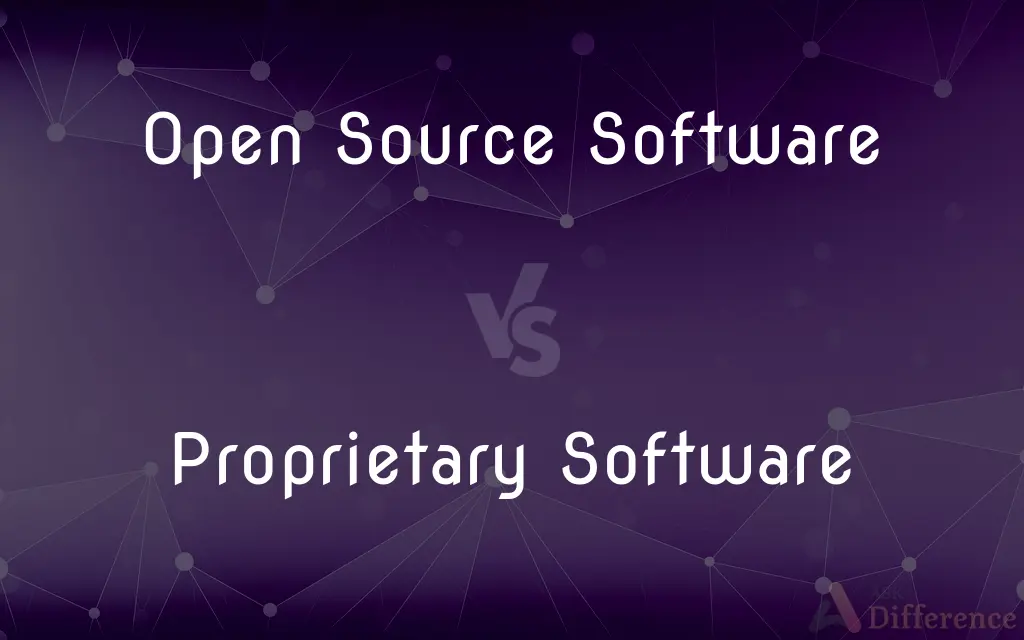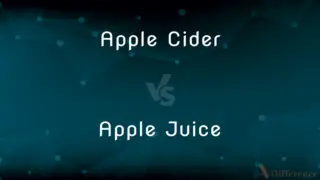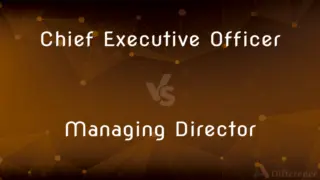Open Source Software vs. Proprietary Software — What's the Difference?
By Tayyaba Rehman — Published on January 15, 2024
Open Source Software allows users to access, modify, and distribute the source code, while Proprietary Software restricts access and modification of its code.

Difference Between Open Source Software and Proprietary Software
Table of Contents
ADVERTISEMENT
Key Differences
Open Source Software is characterized by its accessible source code, encouraging collaboration and modification. In contrast, Proprietary Software has closed source code, meaning it's not accessible for public modification or scrutiny.
Open Source Software often fosters community-driven development and innovation. Conversely, Proprietary Software relies on a controlled, centralized development process by the owning company or individuals.
When it comes to cost, Open Source Software is typically free or low cost, making it attractive for various users and developers. On the other hand, Proprietary Software often involves purchasing licenses or subscriptions.
In terms of customization, Open Source Software offers high flexibility, allowing users to tailor the software to their needs. However, Proprietary Software usually provides limited customization options within the framework set by the provider.
Regarding support and updates, Open Source Software relies on community support and contributions, which can be inconsistent. Proprietary Software, meanwhile, often comes with dedicated customer support and regular, controlled updates.
ADVERTISEMENT
Comparison Chart
Source Code Accessibility
Accessible and modifiable
Restricted and closed
Development
Community-driven and collaborative
Centralized and controlled
Cost
Generally free or low cost
Involves licenses or subscriptions
Customization
High flexibility for modifications
Limited to provider's framework
Support and Updates
Community-based, can be inconsistent
Dedicated support, regular updates
Compare with Definitions
Open Source Software
Customizability
The flexibility of Open Source Software enables tailored solutions.
Proprietary Software
Professional Support
Proprietary Software often comes with reliable, professional support.
Open Source Software
Cost-Efficiency
Using Open Source Software can significantly reduce software expenses.
Proprietary Software
Closed Code
Proprietary Software like Microsoft Office keeps its source code confidential.
Open Source Software
Accessible Code
Open Source Software like Linux allows anyone to view and modify its code.
Proprietary Software
Standardization
Proprietary Software offers a consistent, standardized user experience.
Open Source Software
Community Collaboration
Open Source Software thrives on community contributions.
Proprietary Software
License Purchase
Using Proprietary Software typically requires purchasing a license.
Open Source Software
Innovation-Friendly
Open Source Software often leads to rapid and diverse innovation.
Proprietary Software
Controlled Development
Proprietary Software is developed under strict company guidelines.
Common Curiosities
Can I trust the security of Proprietary Software?
Generally, yes, as it undergoes rigorous testing and updates by the owning company.
Do companies use Open Source Software?
Yes, many companies utilize Open Source Software for its flexibility and cost-effectiveness.
How can I contribute to Open Source Software?
You can contribute through coding, testing, documentation, or even community support.
What defines Proprietary Software?
Software owned by an individual or company with restricted access to its source code.
Is Open Source Software always free?
While often free, some Open Source Software may have costs associated with additional services.
What is Open Source Software?
Software with publicly accessible source code for use, modification, and distribution.
Are updates frequent in Proprietary Software?
Typically, yes. Proprietary Software usually has regular, controlled updates.
Are there legal implications of using Open Source Software?
Yes, you must comply with the terms of the software's license agreement.
Is training available for Proprietary Software?
Often, yes. Many providers offer training and support for their software.
How do I choose between Open Source and Proprietary Software?
Consider factors like budget, support needs, customization, and security requirements.
Can I modify Open Source Software for my needs?
Yes, the open code allows you to customize the software as needed.
Can Proprietary Software be more user-friendly?
Sometimes, as it often comes with standardized interfaces and support.
Do I own the changes I make to Open Source Software?
This depends on the software's license. Some require you to share changes publicly.
Can Proprietary Software be more secure?
In some cases, due to controlled development and frequent updates.
Share Your Discovery

Previous Comparison
Apple Cider vs. Apple Juice
Next Comparison
Chief Executive Officer vs. Managing DirectorAuthor Spotlight
Written by
Tayyaba RehmanTayyaba Rehman is a distinguished writer, currently serving as a primary contributor to askdifference.com. As a researcher in semantics and etymology, Tayyaba's passion for the complexity of languages and their distinctions has found a perfect home on the platform. Tayyaba delves into the intricacies of language, distinguishing between commonly confused words and phrases, thereby providing clarity for readers worldwide.
















































